
BATTLE LINES: GANGS OF TOLEDO
As fathers falter, gangs fill the void
Some in Toledo striving to break the cycle
4/30/2013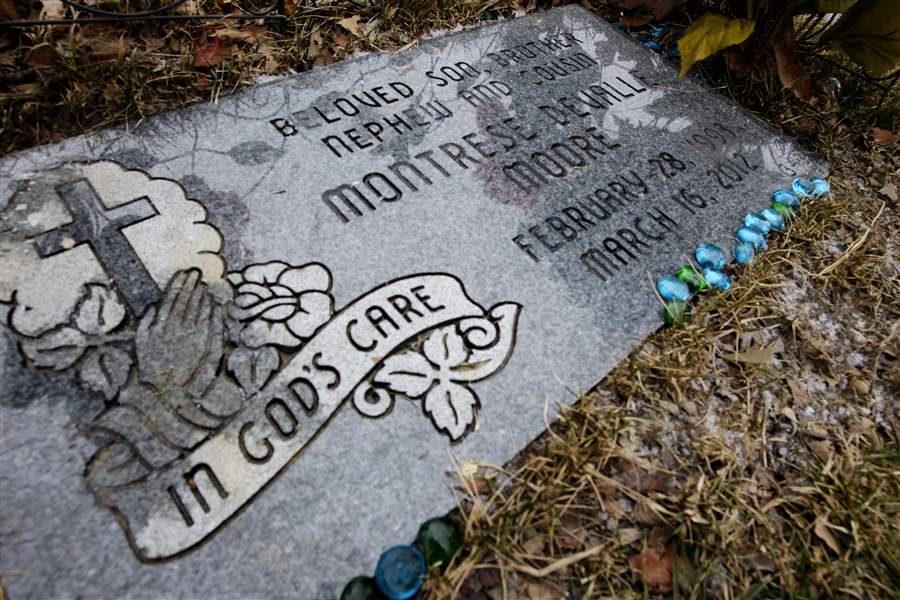
The gravesite of 19-year-old Montrese Moore, Mitchell Moore's son, who was killed in a shooting at Gas & Go parking lot at the corner of Cherry and Bancroft streets.
The Blade/Amy E. Voigt
Buy This Image
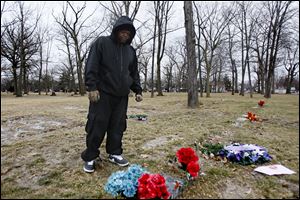
Mitchell Moore, an ex-gang member, stands at the grave site of his son Montrese Moore, a member of the Manor Boyz who died last year at the age of 19 in a shooting at the corner of Cherry and Bancroft streets.
Second of four parts
Mitchell Moore says he should be dead.
Selling drugs, stealing cars. Shooting at people, being shot at. Taunting rival gang members.
Article: Female gang member ponders life beyond the street
Video: From Fathers to dads
Photo galleries: The Moore Family, Willie Knighten
Storify: Discuss the series on social media with #toledogangs
Map: Interactive Toledo gang map
About the series:
Battle Lines: The Gangs of Toledo
Videos: Battle Lines: The Gangs of Toledo
Reporter: Taylor Dungjen
Photographer: Amy E. Voigt
Getting the gang story: How 2 Blade staffers overcame obstacles to cover Toledo's gangs
Ruthless — it’s tattooed on his right arm.
Moore survived the streets. He served his time in prison. He wants his experiences to inspire his children to be better, not be a how-to guide for a life in the system.“I don’t know how I’m alive. I think it been because a lot of my closest friends is dead,” said Moore, now 44. “It’s just like I’m next.”
“I’m tired of seeing my kids in jail. Getting murdered,” he said. “ … I used to tell them all the stuff I did and went through wasn’t right. … I went to prison so they wouldn’t have to go.”
Four years ago, the football coach of Moore’s son, Marquise Moore, called and invited him to watch practice.
Moore had been out of prison for six years but was still “selling drugs, carrying guns, running around here doing everything up under the sun,” he said. He’d hardly been around for Marquise, who was in eighth grade at the time, or any of his other 16 children.
Watching Marquise on the field changed everything. Moore went to the practice as a man who hardly cared. He left ready to be a dad.
“After practice I told him, ‘I'll never be in the streets again in my life. I’m going to be with you and let you make it,’ ” Moore recalled.
RELATED ARTICLE: Female gang member ponders life beyond the street
PHOTO GALLERIES:
With some reckoning, Moore realized that his life might have been different had his father been around. If he had known from the start how important that was, he might have been able to save some of his other sons.
Most current and former gang members who talked to The Blade said they grew up without a father.
Some, to this day, do not know who their biological fathers are. Others said their fathers are in prison, or addicted to drugs, or raising other children.
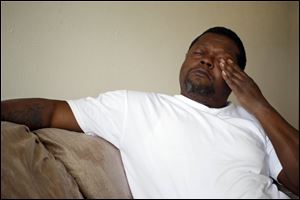
Mitchell Moore weeps as he remembers his slain son. The elder Moore survived the streets. He served time in prison. He says he wants his experiences to inspire his children to be better, not be a how-to guide for a life in the system.
‘With the fellas’
Anthony Moore II — who is not related to Mitchell Moore — said it took him 23 years to learn the truth about his father, a man he never met.
A leader of the LBV — Lawrence Blood Villains — Anthony said he recently found out the man he believed was his father was not.
“I had a good home raising,” he said. “Honestly. Upbringing and everything was good, but no father. So I’m out here with the fellas. We all want to be cool.”
Wanting to be cool was a pathway to the streets.
When he was 20, Anthony was shot in the chest while beating up a man wearing a “blue flag on his shoulder” in a Blood neighborhood.
During the scuffle, the man in blue shot twice.
“Hit me straight to my chest,” Anthony said. “ … I was blessed. I made it out alive. … He was aiming to kill, the doctor said.”
Life on the streets gave Anthony a new family, one with older men he felt he could look up to.
“Some people, it’s all they got is the block. That’s all,” said Anthony, who has a full-time job at a Maumee factory. “ ... Like, we all together. If anything happen to you, I’m gonna ride for you and vice versa.”

The gravesite of 19-year-old Montrese Moore, Mitchell Moore's son, who was killed in a shooting at Gas & Go parking lot at the corner of Cherry and Bancroft streets.
Voice of experience
Willie Knighten, Jr., once the undisputed leader of the Southside Folk, says much of the gang problem would be solved if fathers were active in their children’s lives.
“If fathers would put themselves back in their rightful places, then a lot of this will be stopped because a true dad won’t let a guy like me put a pistol in your son’s hand,” Knighten, 41, said.
He spent 13 years in prison — sentenced to life on a murder conviction — but was released in 2009.
Knighten is a different kind of guy these days.
“I turned a new leaf,” he told an inmate at the Lucas County Correctional Treatment Facility.
Every Wednesday, Knighten visits the downtown Toledo facility to teach classes for the Ridge Project, which aims to help felons — many of them fathers, some of them gang members — live better, more productive lives upon release.
The men there look up to him — they know he’s been exactly where they are now.
“I depend on this project,” said a 22-year-old member of the Manor Boyz gang. “That man Knighten, he speak the truth. … He said he a shooter, I’m a shooter.”
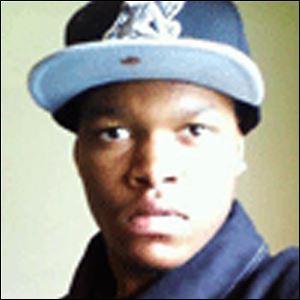
Montrese Moore was only a child when he joined the Manor Boyz, according to a relative, a 22-year-old Manor Boy. Mitchell Moore said he used to warn Montrese ‘plenty of times’ that he might end up dead. ‘Finally wrapped around and happened.’
Sobering numbers
Ray Swisher, an associate professor of sociology at Bowling Green State University, has studied the impact that a father’s incarceration has on children.
A 2011 study by Mr. Swisher and Michael Roettger of the University of Colorado-Boulder found that children with an incarcerated father are more likely themselves to end up in trouble as a juvenile and are at increased risk for arrest as an adult.
“I think it goes all the way back to when kids are young enough to be observant of their environment,” Mr. Swisher said. “ … I think, in part, they [the parents and children] share that same disadvantaged environment.”
In the 2011 paper, the researchers noted that the impact was similar among black, white, and Hispanic males, although black and Hispanic children were more likely to have an incarcerated father. Thirteen percent of young men reported that, at some point in their lives, their biological father was incarcerated.
A 2009 study, cited by Mr. Swisher and Mr. Roettger, determined that, in 2000, an estimated 2.1 million children had incarcerated fathers.
That same study found that black children growing up in low-income households were more likely to have an imprisoned father and that 25 percent of black children born in 1990 would, by the time they reached 14 years old, have an imprisoned parent.
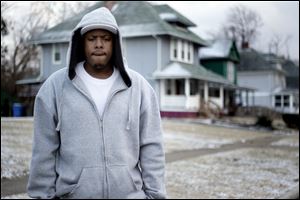
Anthony Moore II — who is not related to Mitchell Moore — said it took him 23 years to learn the truth about his father, a man he never met. ‘Honestly. Upbringing and everything was good, but no father. So I’m out here with the fellas. We all want to be cool,’ says Moore, a member of the Lawrence Blood Villains.
Losing a son
Mitchell Moore was about 10 minutes early for his 9 p.m. shift on March 16, 2012, at JoJo’s Original Pizzeria on Monroe Street.
He was still sitting in his car when his cell phone rang.
“Your son just got shot, your son just got shot,” the voice on the other end screamed. “They pumping on his chest.”
Moore raced toward Mercy St. Vincent Medical Center to where his son, Montrese Moore, 19, had been taken.
Mitchell Moore sat with Montrese’s mother, Florence Watkins, inside the hospital waiting for an update on their son’s condition.
When a group of doctors approached, Moore already knew.
He grabbed Florence.
“The only thing I could remember is her voice,” he said. “That’s all I could remember. Sometimes I just dream about hearing her screaming my name.”
One of the doctors came close enough to whisper in Moore’s ear:
“We just want you to know that he didn’t feel no pain. He died instantly.”
Growing up
When Mitchell Moore was 18 months old, his mother, Mary Moore, moved her five children from Lebanon, Tenn., to Toledo.
His father, James Moore, moved north too, but “he wasn’t no help,” Mitchell Moore said. “He came from down south, but he wasn’t living with us. He was living with someone else, taking care of their kids.”
His mother made a life for her family inside a four-bedroom apartment at Moody Manor, a low-income apartment complex with a long history of gangs and violence.
Mary Moore went to work every day at 4 a.m. — first at a Kewpee’s hamburger joint and eventually in school cafeterias. She retired from Mercy St. Vincent Medical Center where she worked for at least 15 years.
Living at the Moody Manor exposed Moore to too much, too early, too fast.
His mother tried to hold her son down, but the street life was too alluring.
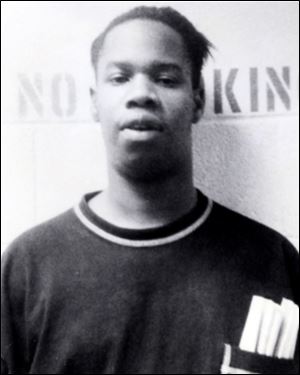
Willie Knighten, in 1984.
Fast money, nice cars, nice clothes, girls.
She couldn’t keep up.
“I felt grown and can’t nobody tell me what to do,” Moore recalled. “My mom, she raised me far enough and she couldn’t really do what a man was supposed to do.”
The Manor taught Moore the art of hustling. It’s where he learned how to defend himself, and where, as a fourth grader, he found himself dodging bullets.
It started as an argument between a resident and visitors but escalated into a neighborhood brawl; that’s how it was in the Manor. One person gets in a fight, everyone else comes to help.
The visitors left but came back armed. One man stuck his gun out a window and fired.
“That’s all I heard. Zoom, zoom. Bullets going past your head. Like at war. As a kid,” Moore recalled. “It been crazy like that, the Manor, ever since I can remember. Shootings. Stabbings. All type of stuff going on since I was a kid.”
Moore’s mother enrolled him at Waite High School — where his sisters went — but he protested by trying out for Scott High School’s football team.
He said he impressed the coaches so much that they helped him convince his mother to transfer her son to Scott.
“Soon as I got to Scott I started running the streets, stealing cars,” Moore said. “Wasn’t no man there to tell me no.”
He played one season with the Bulldogs, but as soon as it was over, he stopped going to school, assuming that the coaches would track him down and drag him back.
A strong, positive male influence.
It’s what he wanted.
It’s what he needed.
The coaches never came.
By 17, Moore had his first child — a daughter. He started to get arrested and, eventually, was caught up in felony cases that sent him to prison. He was locked up three times, a total of about six years.
Moore was methodical about which crimes to commit.
He never shot anyone, he says, though he said he “probably shot at somebody hoping and praying that I didn’t him ’em.”
“I was the type of person, like this, I’m already doing one thing wrong — if I’m stealing a car, and that’s how I’m going to get my money, I’m going to take the tires off of it,” Moore said. “I ain’t going to steal a car and then snatch a purse.”
It might seem strange, but his mother — who did not condone his lifestyle — influenced his criminal behavior.
He imagined what it would be like if someone knocked his mother to the ground and grabbed her purse. He couldn’t do that.
What if he broke into a house where an older person lived? Couldn’t do that, either.
“I never wanted to hurt nobody,” Moore said. “ … So I got into wanting to sell drugs, thinking that’s going to be easier. But that’s hurting somebody too. … I never thought about that until I got older.”
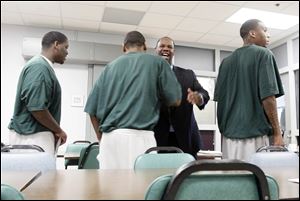
Willie Knighten, once the undisputed leader of the Southside Folk, greets inmates in the Lucas County Correctional Treatment Facility. Every Wednesday, Knighten visits the facility to help felons live better, more productive lives upon release. He says much of the gang problem would be solved if fathers were active in their children’s lives.
A poor example
Moore said it was the stories about his childhood, growing up in the Moody Manor, and his experiences with 45 Piru — the gang he ran with — that attracted his children to the complex and the gang.
“I guess everybody told them that was a good thing, telling my past, so all my kids hung around the Moody Manor,” Moore said.
Montrese was only a child when he joined the Manor Boyz, according to a relative, a 22-year-old Manor Boy. He spoke on the condition of anonymity, fearing retaliation.
This Manor Boy was 8 when he was jumped into the gang; Montrese, who was about two years younger, was already in the gang.
“Montrese is my best friend,” he said. “We did everything — hit licks, everything. I’m talking ’bout we set boys up, … shoot boys, we did everything.”
The elder Moore said he used to warn Montrese: You might not end up in jail. You could end up dead.
“I told him that plenty of times,” Moore said. “Finally wrapped around and happened.”
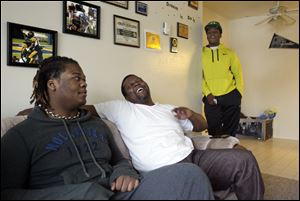
Mitchell Moore laughs with his sons Marquise Moore, left, who recently signed with the University of Toledo for a full scholarship to play football, and Michael Moore, who is planning to attend Adrian College in the fall.
The only way out?
If you ask, gang members will tell you: You live by the gang. You die by the gang.
Hopelessness.
“Inmates up here tell us they gauge their life at 25,” said Lucas County sheriff’s Sgt. Tony Grove, who works in inmate services.
“If they make it to 25, they feel they’ve done something pretty [significant]. Most of them don’t expect to live that long. Young people that are in gangs, they say 25 is a big goal of theirs,” Sergeant Grove said.
Montrese, who turned 19 three weeks before he was killed, was one of seven people who died as a result of Toledo’s gang violence last year.
The man who killed him was 20 years old. He is now serving a life sentence.
“We have lost a whole generation of young men and young women,” said Waymon Farmer of the Self-Improvement Workshop Series.
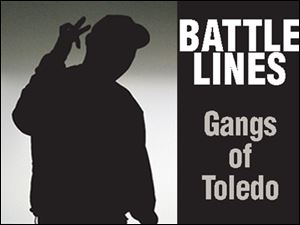
A member of the hispanic gang "Vato", who did not want to be identified, flashes a gang sign at his home in Toledo on March 8, 2013.
Lost time
Mitchell Moore is making up for lost time with Montrese.
He tries, often as he can, to visit his son’s grave site at the Historic Woodlawn Cemetery.
“Out the month, I think I spent 20 days at the cemetery because I think I missed a lot of him growing up,” Moore said. “When he was first here as a baby, I used to be there, but as he got a little older, I wasn’t around. … I could see how that could affect people because I looked at my dad and he was never there for me.”
For a long time, Moore was more into the streets than he was his children.
“I wasn’t thinking about doing what I was supposed to be doing, like I’m doing now,” Moore said. “It was about getting mine. When I grew up, the people that I hung around with, they told me if I didn’t go to jail, I wasn’t nothing. You’re growing up around people like that, and you’re going to jail.”
Moore’s oldest son, Mitchell Moore, Jr., is in his fifth year of an 18-year prison sentence for involuntary manslaughter, felonious assault, and felony child endangering.
In 2008, the younger Mitchell was found guilty of tying up, beating, and burning 23-month-old Tayvon Evans.
In the coming weeks, the elder Moore will find himself in Lucas County Common Pleas Court again — this time to watch as another son, James Moore, 21, is put on trial for his alleged role in a shooting that killed 1-year-old Keondra Hooks and critically injured her 2-year-old sister, Leondra, who is now 3.
Also charged in the Moody Manor shootings are Keshawn Jennings and Antwaine Jones; all three are Manor Boyz.
Moore has another chance to be the dad he always wanted, the dad his other children need.
Through probation, he has a security job that pays him $498 a month. He uses it to pay $400 a month in rent. What’s left is used for other necessities — soap, toothpaste, food.
Marquise, whose football practice changed Moore’s outlook on life, is 17 now and a senior at Whitmer High School. In March, he finished fourth in the state for wrestling in his weight class.
In February, Marquise committed to the University of Toledo, which offered him a full scholarship to play football.
Another of Moore’s sons, Michael Moore, 18 and a senior at Whitmer, will play football at Adrian College in the fall.
“I’m glad I ain’t like I used to be; I’m glad where I’m at,” Moore said. “... As long as I got my kids with me, I’m cool. … They keep me motivated to keep living, for real. To really keep living.”
Two days before the one-year anniversary of Montrese’s death, one of Moore’s daughters gave birth to a boy. Nine pounds, 8 ounces.
“The next football star,” Moore said. The boy’s name? Christian Montrese.
Contact Taylor Dungjen at: tdungjen@theblade.com, 419-724-6054, or on Twitter @taylordungjen.